WPLift is supported by its audience. When you purchase through links on our site, we may earn an affiliate commission.
Exploring the Potential of AI Content Generators for WordPress Bloggers
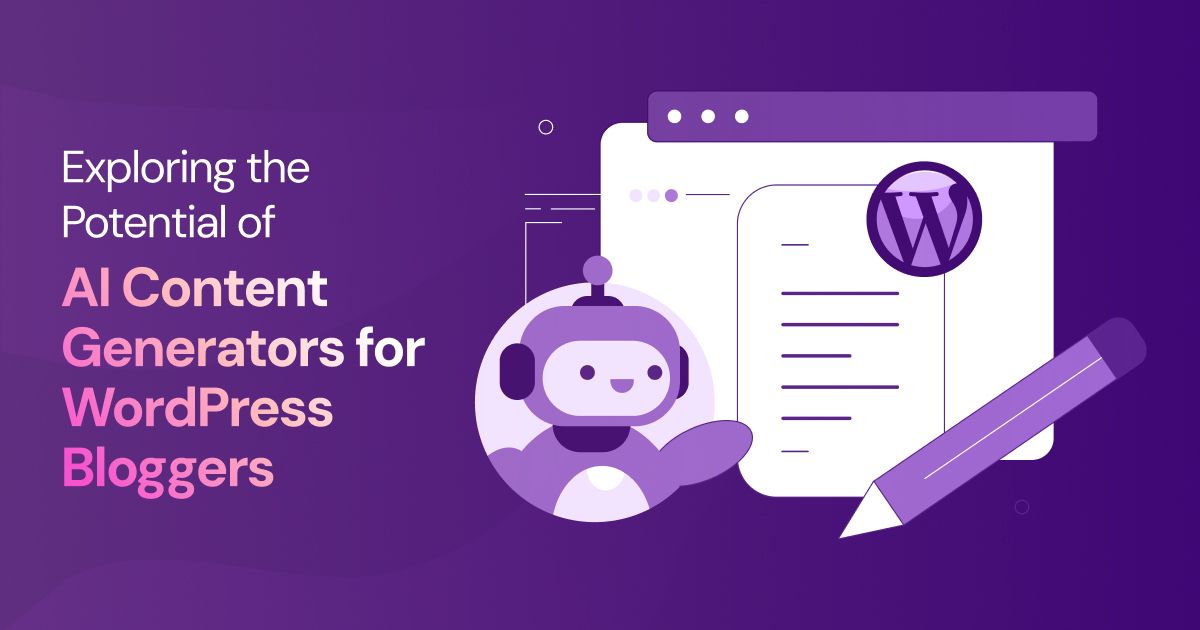
The last time we checked, there were over 200 AI content generators for WordPress available in the free plugins directory alone. By the time you read this and check for yourself, that number will have probably increased.
The truth is that, much as it has with just about every aspect of the digital realm, AI has firmly embedded its way into WordPress and is here to say.
On the one hand, WordPress AI tools like AI Engine and GetGenie boast a wealth of potential to cure Writer’s Block, turbocharge the creative process, and help bloggers scale their sites faster than ever before.
On the other hand, might it also carry the potential to hinder your SEO efforts, turn off users who crave real human experiences, and even harm your bottom line?
In this guide, we weigh up the pros and cons of using AI for blogging and explore its effect on search rankings, audience perception, and monetization.
If, after all that, you decide to harness the power of Artificial Intelligence for good, we’ll also share with you the best WordPress AI content creators and the most ethical and effective ways to use them.
Ready? Let’s explore.
Using AI Content Generators for WordPress Blogs: Pros and Cons
Pros
- Improve productivity – Content generators help streamline the creation process and automate repetitive tasks, helping you to produce more high-quality content in less time.
- Generate ideas – Writers’ block is the worst. AI tools can help you get unstuck by generating ideas, helping with keyword research, and creating outlines.
- Enhance SEO with minimal effort – Most tools thrive in creating snippets such as meta descriptions and alt-tags, those small but crucial details that are vital for SEO success.
Cons
- The risk of losing originality and authenticity – AI content is generated based on information that already exists on your web. Without adding your own human touch, your content may seem generic and uninspiring – the exact opposite of what you need to engage readers.
- Potential SEO pitfalls – AI content alone is rarely enough to satisfy Google’s E-E-A-T criteria. Unless it’s edited, that content could be of such low quality that it negatively affects your rankings.
- Plugins require more management – Every new WordPress plugin you add impacts your site performance. They may also cause conflicts that can lead to WordPress errors.
The Potential Impact of AI on SEO
Ever since tools like ChatGPT burst onto the scene a few years ago, there have been more myths and misconceptions about AI’s impact on Search Engine Optimization than we care to count.
Undoubtedly the biggest myth is that Google automatically penalizes AI-generated content and therefore it should be avoided at all costs lest you get struck with a manual action and see your search visibility plummet.
The truth, however, is much more nuanced.
The official Google Search Guidance on AI includes a couple of key points that reveal how the search giant really feels about content created with Artificial Intelligence:
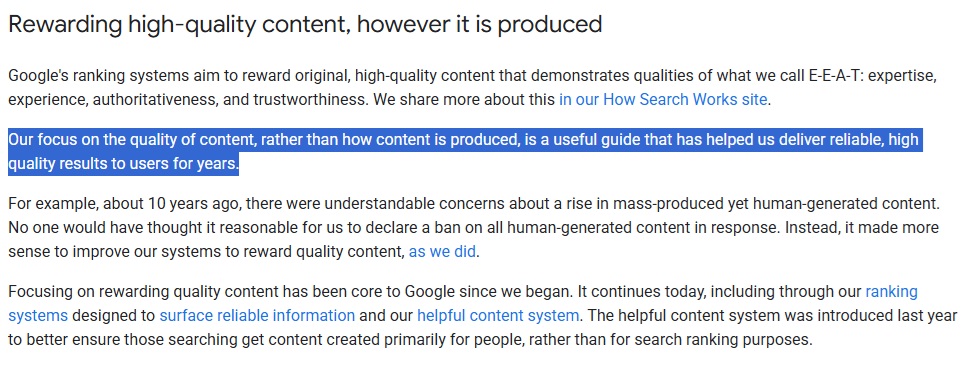
Source: Google
First, the company makes it clear that they focus on original, high-quality content, rather than the method used to create that content.
So no, you won’t immediately violate the Google algorithm simply for using AI. You might, however, fail to make a dent in SERPs if you only use AI.
This isn’t because Google hates AI, it’s because Google hates low-quality, unoriginal content, and the truth is that the output generated by most AI content tools can rarely be considered ‘high-quality’ without some level of human input.
Think about it:
AI tools are trained on existing information that already exists on the Internet. So, when you use AI to create an article, you’re not creating anything new, you’re simply generating a regurgitation of information and ideas that are already out there.
That’s not exactly ‘original,’ is it?
What’s more, AI tools have no expertise or experiences of their own, so their output is unlikely to satisfy Google E-E-A-T criteria.
When AI Becomes a Problem for SEO
So, if Google won’t instantly issue a manual action for using SEO, where does this myth come from?
Partly, it comes from the quality issue discussed above. If you throw out an AI article without adding your own input, it probably won’t be of sufficient quality to gain a high-ranking.
Mostly, however, it comes from the second key point worth highlighting from their official AI guidance:

Source: Google
If you’re using AI to churn out a glut of content solely to get ranked on Google with no thought as to whether that content helps actual human beings, that’s considered spam. In Google’s eyes, it’s no different from keyword stuffing or any number of other black hat strategies that ethical content creators steer clear of.
The Potential for Good: How Artificial Intelligence Can Help SEO
While lazy or manipulative use of AI content generators certainly has the potential to harm your Search Engine Optimization efforts, that doesn’t mean they can’t be used to help you up your SEO game ethically and effectively.
Just consider how much work goes into creating a blog post.
Perhaps you first open a tool like SEMrush or Ahrefs to do keyword research. Then you brainstorm compelling title ideas around that keyword, then you plan your outline, and so on…
It’s a lot of work that often means moving back and forth between multiple tools and platforms before you finally get to hit publish.
Now, consider a plugin like GetGenie.
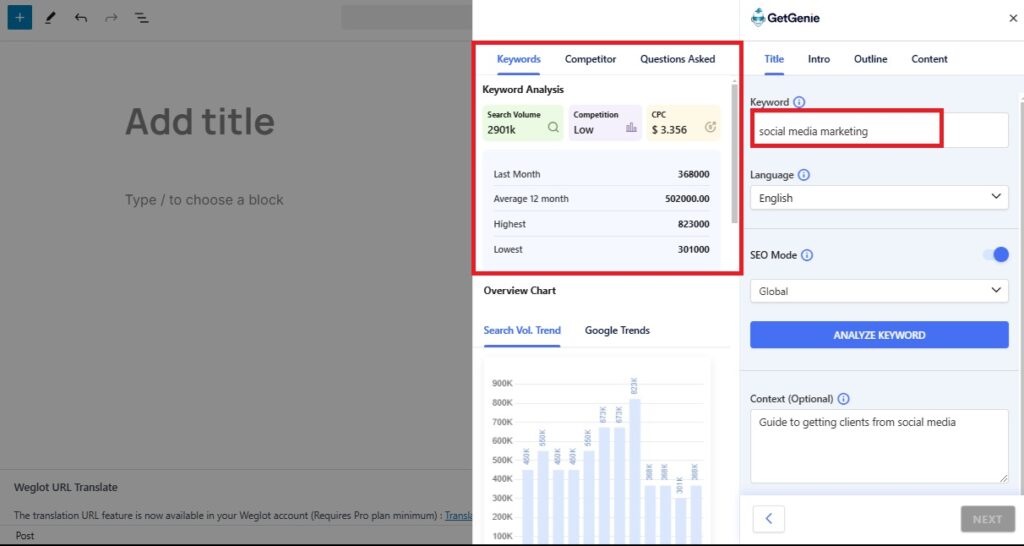
Connect it to your WordPress site, and you can run keyword analysis directly from within the post editor before using the same tool to generate a title, outline, and even the first draft of your post.
You’re still the one writing the article. It’s still your unique human experience, insights, and expertise that you’re sharing. However, a single AI tool has done all the preparation and planning for you, ultimately streamlining the entire blog creation process and making you a much more efficient writer.
There are many other WordPress plugins that use AI as well. For example, Imagerr.ai can automatically generate alt text for your images with AI.
To sum all that up, AI content generators can be a powerful asset for WordPress SEO, just as long as they supplement, rather than replace, human expertise and originality.
How Do Users Feel About AI Content?
While AI’s potential impact on your SEO certainly matters, what matters even more is how it impacts your audience. After all, if your readers are going to reject AI-generated content, it’s not going to help your brand at all, no matter how much it benefits your search visibility.
Ultimately, it seems that consumers still have mixed feelings about AI.
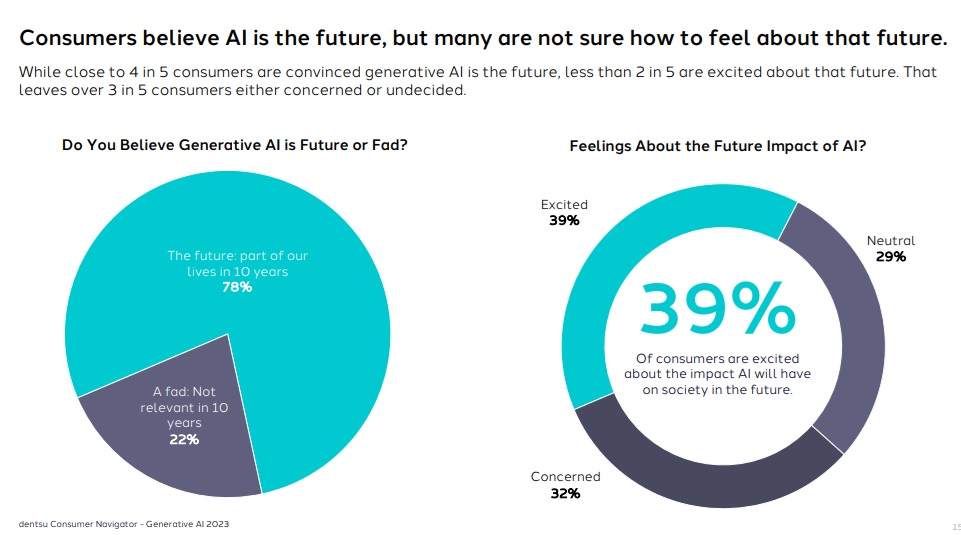
Source: Dentsu
One study by Dentsu revealed that while nearly 4 in 5 people believe generative AI is the future, less than 2 in 5 are actually excited about it, leaving the majority of consumers either skeptical or outright concerned about what that future looks like.
A significant part of this skepticism comes down to a question of authenticity, or, rather, a perceived lack thereof.
Consumers value real human interactions, and AI-generated content can often feel impersonal, uninspired, or even downright deceptive. You only need to look at the tremendous backlash towards Google’s ‘Dear Sydney’ campaign promoted during the 2024 Olympics to see how people feel about AI attempting to replace genuine human connection.
Google + Team USA — Dear Sydney
If you missed it, the ad centered around a father using Google Gemini to help his daughter craft what should have been a heartfelt message to her hero, Olympian Sydney McLaughlin-Levrone.
Instead of feeling inspired, many viewers were unsettled by the ‘soulless and strange’ idea of an AI taking over what should have been a deeply personal and human experience.
This sentiment is echoed in research on how people react to AI-generated emotional messages.
A study published in the Journal of Business Research shows that when consumers believe a heartfelt message was written by AI instead of a human, they feel a sense of moral disgust and are less likely to engage with the brand. However, when AI is used in a more factual or assistive way, such as editing existing content rather than generating it from scratch, this negative reaction diminishes.
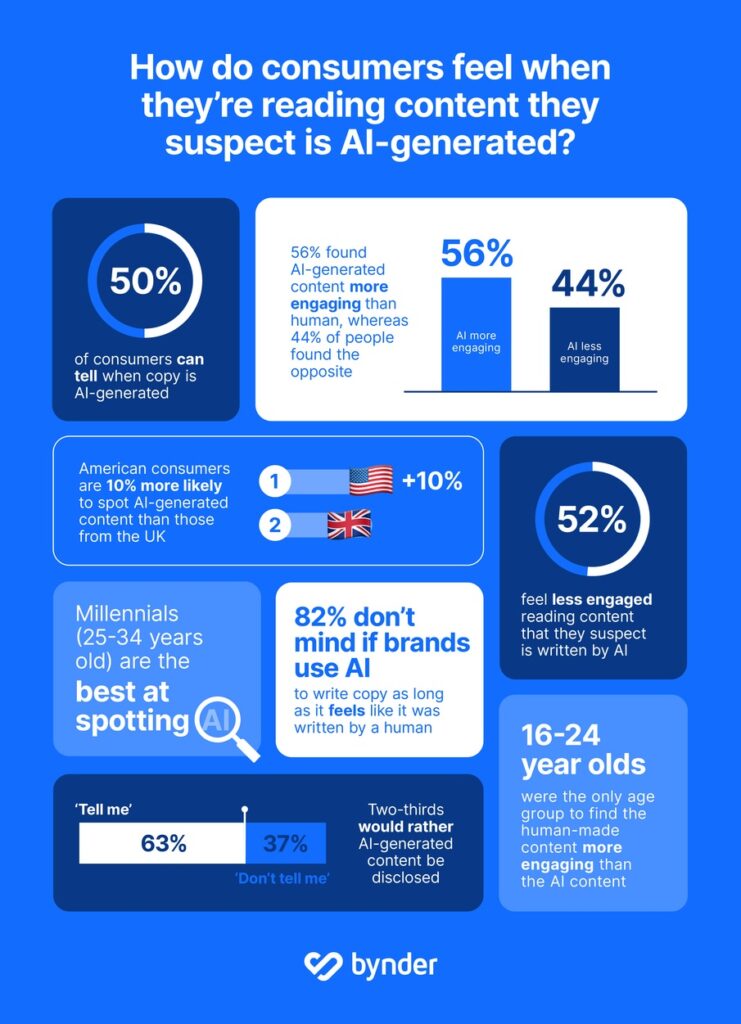
Source: Bynder
Research by Bynder found that only 50% of people could correctly identify AI-generated content. Yet, when AI-generated content was tested in a blind comparison, it was rated as more engaging than human-written content.
However, the moment people became aware they were reading AI-generated material, 52% reported feeling less engaged, suggesting that perception plays a big role in how AI content is received.
Where AI is used also matters. Consumers are more accepting of AI-generated content in some contexts than others. For example, Bynder’s research also found that:
- 51% prefer news articles to be human-written.
- 50% believe service reviews should be written by a person.
- Only 37% think blog content needs to be human-authored.
- 31% believe product descriptions should be human-written.
Despite these concerns, most consumers are not outright rejecting AI. In fact, 82% of people agree that they don’t mind brands using AI to write content as long as it still feels human.
This presents an important takeaway for WordPress bloggers:
AI isn’t the problem—Inauthenticity is.
People don’t want content that feels robotic, soulless, or manipulative. They want real, valuable, and engaging experiences.
When AI is used strategically to enhance human creativity rather than replace it, it can help brands create better content without alienating their audience.
How Does AI Content Affect Monetization?
Perhaps more than the impact on SEO and user perception, the one that may be making you most hesitant to use an AI content generator is the potential consequences on your bottom line.
If you’re worried about how advertisers and affiliate networks may feel about their brands being associated with AI-generated content, we’ve got some good news for you.
We looked at the Publisher terms and agreements for three major affiliate networks:
We also looked at the terms for ShareASale, though they’re owned by Awin and adhere to that company’s publisher terms.
Nowhere in any of them did we see any mention that publishers are prohibited from using AI content, only that the content has to be -you guessed it- original and of good quality.
Likewise, Google Adsense publisher policies make no mention of any restrictions on bloggers monetizing AI content.
Again, it all comes down to making the best quality content, regardless of how you make it.
So no, using AI tools won’t hinder your ability to monetize WordPress, but they can certainly help you.
Take Affi.ai for example.
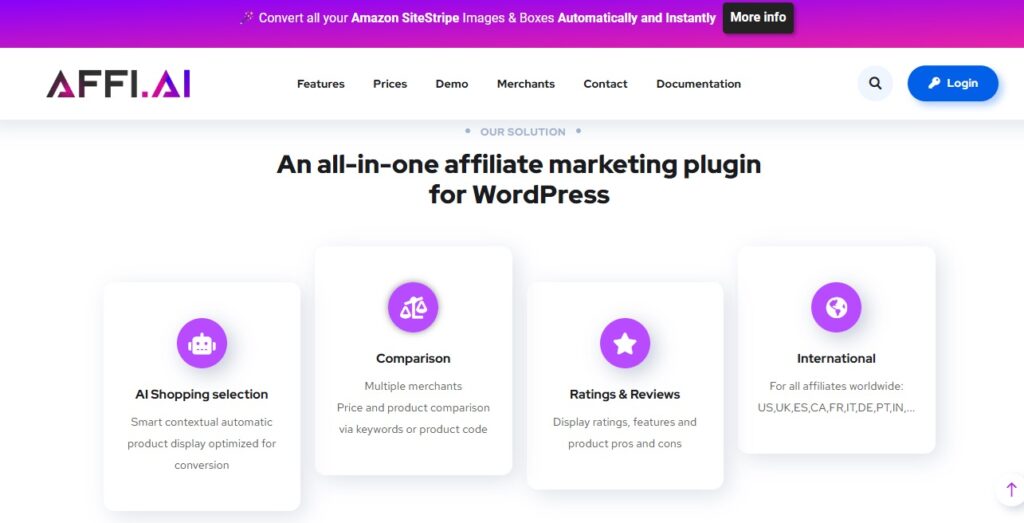
Though it’s not an AI content generator in the traditional sense, it can certainly enhance your content by seamlessly integrating affiliate products in a way that feels organic and valuable to readers.
Instead of simply inserting static affiliate links, Affi.ai dynamically pulls product data from major marketplaces and presents them in a dynamic, attention grabbing fashion, all with real-time pricing and availability.

Or, if you do want AI to create your affiliate marketing content for you, take a look at Gizzmo.
One of the few WordPress AI content generators built specifically for Amazon affiliate content, both the free and paid versions let you search for products on Amazon from within your WordPress dashboard.
Select a product, and Gizzmo uses AI to instantly suggest a number of content themes you can build around that product.
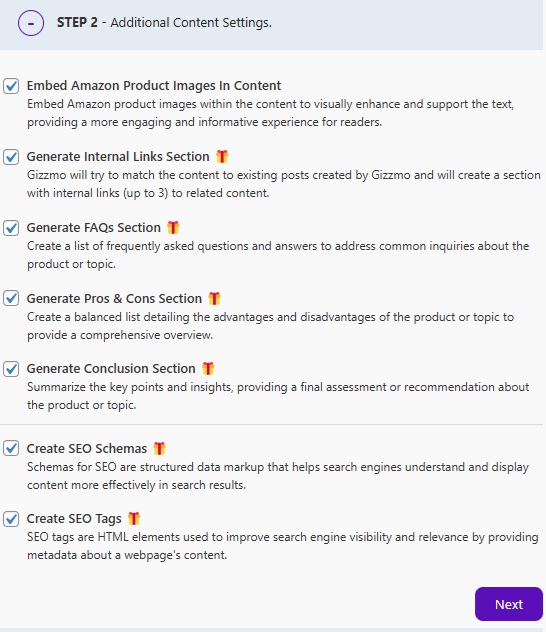
From there, it gets to work on generating a fully fleshed-out piece of content, complete with internal links, FAQs, and product links featuring your affiliate tag.
Now, given the major crackdown on fake reviews, we certainly don’t recommend posting Gizzmo’s generated content as-is, especially not if you want to meet Google E-E-A-T criteria.
Still, the plugin’s AI-generated affiliate content is a great starting point, providing a solid, well-optimized foundation that you can then build upon with your own first-hand experience of using that product.
What’s more, affiliate content plugins like Gizzmo can make a major difference to your productivity, allowing you to make more high-quality content faster.
The more high-quality content you create, the better your earning potential, making content generators an effective way of scaling your affiliate monetization efforts without sacrificing authenticity or SEO performance.
More Top AI Content Generators for WordPress
It’s becoming clear that -as long as they’re used to enhance creativity rather than replace human authenticity- the potential upsides of AI content outweigh a small number of pitfalls that can be avoided with careful attention to quality.
There’s perhaps no better way to explore that potential than to take a look at some of our top content creation plugins.
Below, we share some of the best AI content-generation plugins for WordPress.
Short on time right now? We’ve also provided this handy table providing a quick overview of our top three picks, alongside the three other WordPress AI tools featured earlier in this guide.
| Plugin | Best For | Free Version? | Price |
| GetGenie | AI-Assisted SEO Analysis | YES | $5.60 – $55.40 p/m |
| Affi | Adding dynamic affiliate ads | NO | $39 – $369 p/y |
| Gizzmo | Amazon affiliate content | YES | $7.99 – $139 p/y |
| AI Engine | Multiple AI model options | YES | $59 – $99 p/y |
| Hostinger AI | Long-form content | YES | Free for Hostinger customers |
| RankMath Content AI | Content outlines and ideas | YES | $4.99 – $14.99 p/m |
1. AI Engine
AI Engine is normally praised for its excellent chatbot creator tool, but it has a lot to offer in the content generation department too.
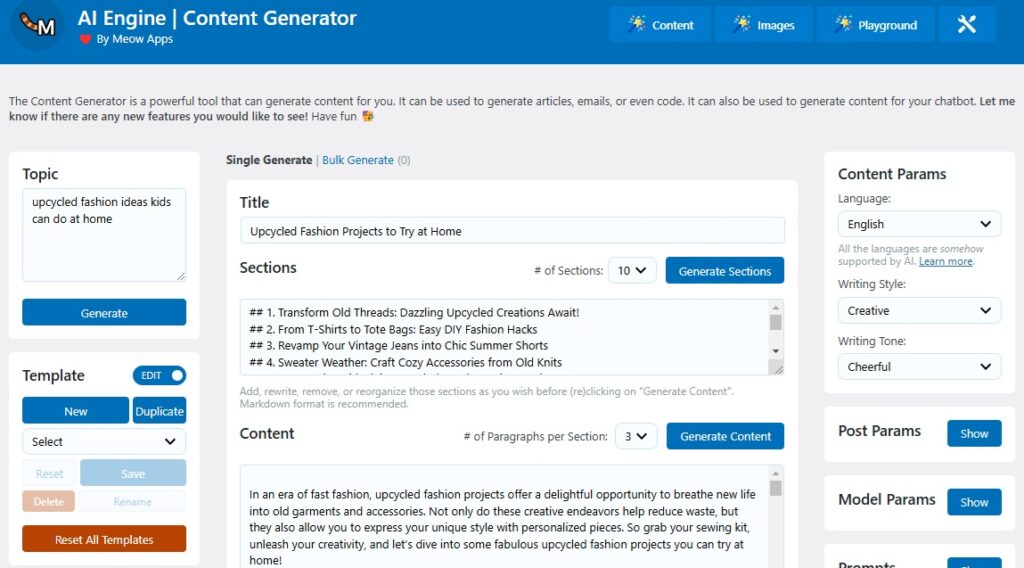
Through a simple user interface, you can enter a topic and use it to generate a compelling title, individual heading sections, and, yes, the content itself.
Each post can be tweaked and customized using a variety of content parameters including language, style, and a host of tone options.
All in all, it’s a great option for WordPress bloggers looking for a quick and easy way to develop strong first drafts that automatically reflect their brand voice.
Biggest Upside:
AI Engine’s biggest strength isn’t in the content generation itself, but in extensive number of customizable settings.
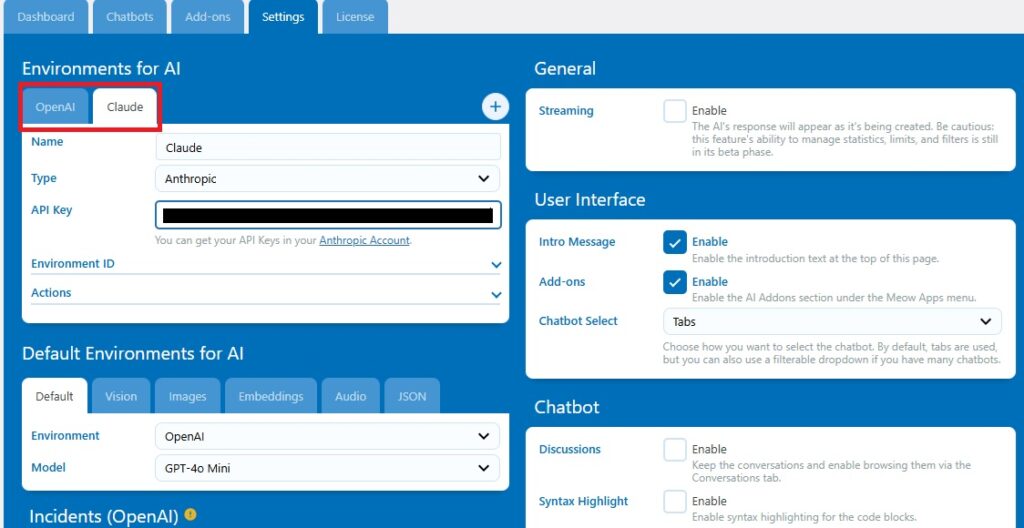
While a lot of content plugins typically run on OpenAI, this tool also lets you generate content using Claude, as well as gives you the freedom to tweak several advanced options.
Ultimately, this makes it incredibly versatile, ensuring that generating content doesn’t mean you’re locked into a single AI model or a one-size-fits-all approach. Instead, you have the flexibility to fine-tune results to match your unique style, needs, and audience.
Biggest Downside:
AI Engine may do a solid job with written content, but the images it produces are of very poor quality.
This is a significant drawback, because image clarity and artistic coherence often fall short, and the results can appear distorted or unnatural, showing that AI still has a long way to go before it can replace human artistic talent in creating impressive visuals.
2. Hostinger AI
If you’re an existing Hostinger Business or Premium customer, you already have an excellent free AI content creator built-in to your package.
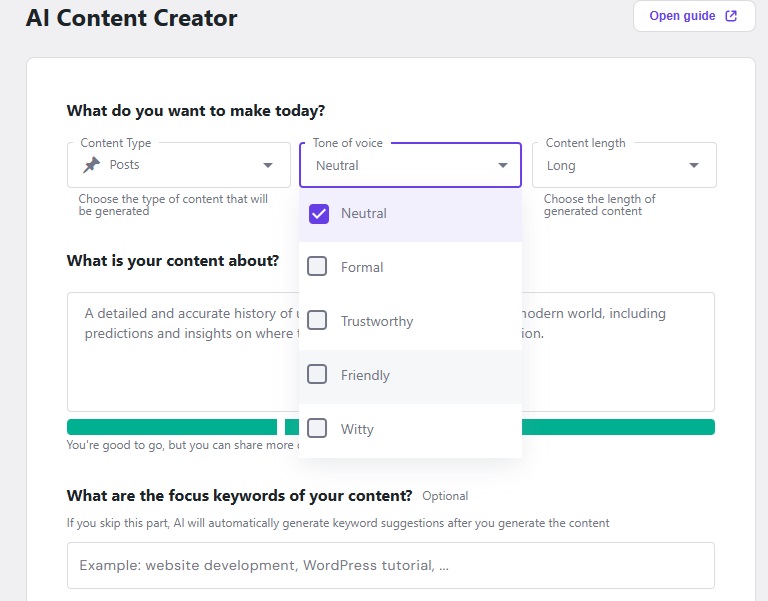
Easy to use, Hostinger AI can be set to create everything from posts and pages to product descriptions, option and confirmation pages, and more.
Simply choose which type of content you want to create, select a tone of voice and length, then enter your prompt and hit Create Content.

The plugin then gives you a fully formatted article complete with an engaging heading and subheading structure.
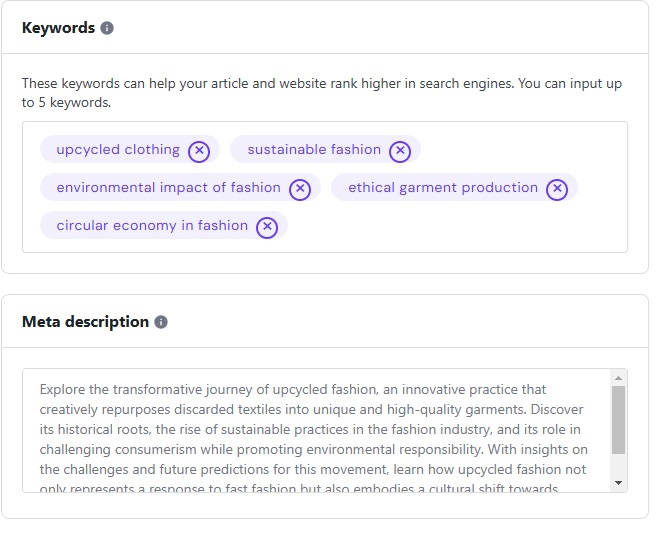
Not only that, but it also takes care of SEO tasks such as recommending keywords and creating your meta description.
Biggest Upside:
The thing we love best about Hostinger AI is that it’s one of the very few free tools out there capable of generating long-form content of reasonable quality.
Make no mistake, the output lacks any warmth or emotion, but when we used it to create several test articles on various subjects, it was more than capable of publishing 2,500+ words of legible, coherent content.
If you ask us, this speaks volumes about the potential of AI to create the kind of in-depth pieces audiences love to sink their teeth into.
Biggest Downside:
Besides the fact that you can’t use Hostinger AI if you’re not using the company as your hosting provider, the biggest drawback is the limited number of settings and options.
For example, there’s only four Tone of Voice Options to choose from, whereas other tools have a lot more. Still, while that’s disappointing, it’s nothing that can’t be solved by putting a bit more effort into prompting.
3. RankMath Content AI
The popular RankMath SEO plugin provides so many valuable features for optimizing your existing content that it’s easy to overlook how useful it can be in creating that content in the first place.
It’s not quite the most beginner-friendly AI tool on this list, but once you get to grips with it, you’ll likely find that it’s an excellent tool for helping you get your ideas into writing in a way that aligns with what your audience is actually searching for.
Biggest Strength:
Ask RankMath SEO to generate a full article for you, and you’re not necessarily going to get stellar results.
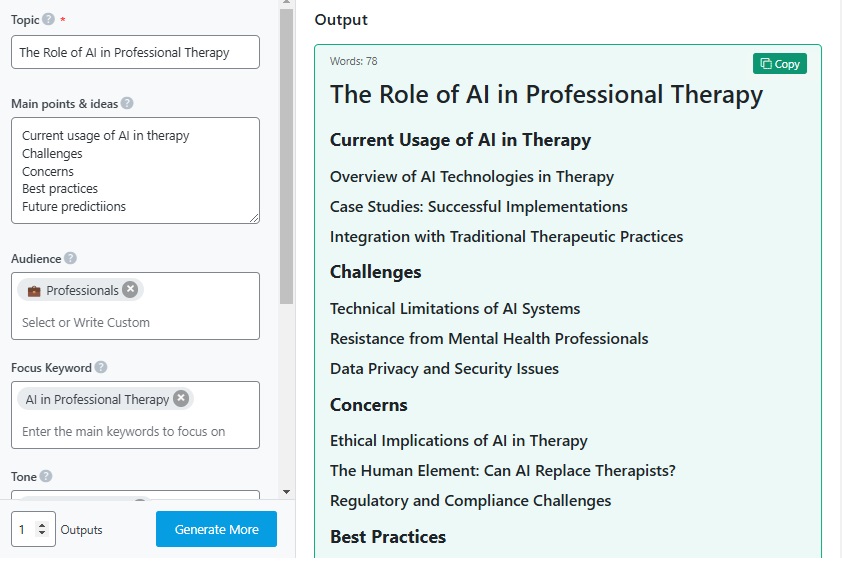
Ask it for topic ideas or outlines, however, and it does an exceptional job at coming up with titles, headings, and overall content themes that are both well structured and highly relevant.
That’s definitely a good thing. Seriously, we’ve often faced times when we had a really good idea for an overall topic, but couldn’t figure out how it could tie in to relevant keywords that our users are actively typing into search engines.
Biggest downside:
RankMath Content AI operates on a credit system, with each generated word costing 1 credit and each keyword research query costing 500.
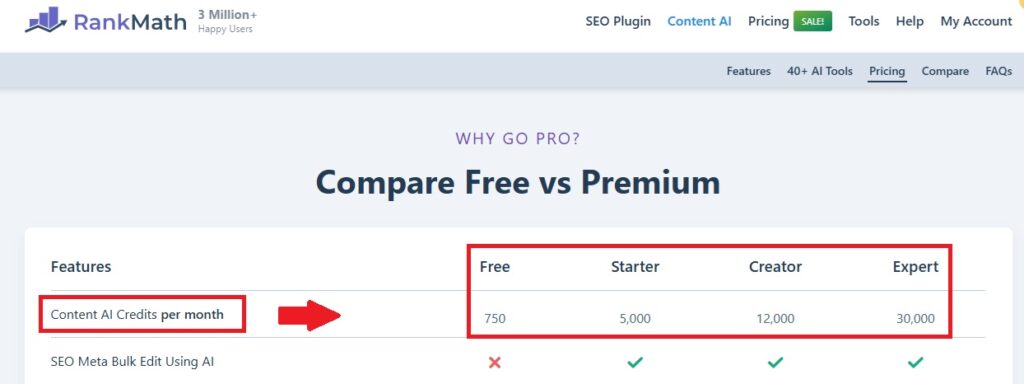
The number of credits you get depends on which plan you sign up for. Naturally, the more you pay, the more credits you get.
The downside to all this is that if you run out of credits, there’s no way to just buy more. You either have to wait until your allowance refreshes at the start of the following month, or you have to upgrade your entire plan.
If anything, this suggests that plugins like RankMath may need to be more flexible with their allowances if AI-generated content is to become a truly accessible and scalable solution for bloggers and content creators of all levels and budgets.
The Potential of AI Content Generators for WordPress Bloggers: Summing Up
While concerns about AI content’s negative impact on SEO, user perception, and monetization are certainly valid, our research shows us that it’s not Artificial Intelligence itself that is likely to cause you any problems, but rather the way you use it.
If you’re simply looking to churn out as many low-effort articles as you can to manipulate search results and rake in the cash, then yes, you’re going to run into trouble because search engines, advertisers, and real users alike all prefer authentic content based on real human insight and experience.
If, on the other hand, you’re considering using a WordPress content generator to help you rather than do everything for you, the potential benefits are multiple.
As we’ve seen throughout this guide, AI content plugins like GetGenie, AI Engine, and RankMath Content AI are not designed to replace your authentic human voice. They’re designed to streamline and simplify the process of getting that voice out to a larger audience by:
- Turning your ideas into structured content outlines
- Ensuring those content outlines align with what your audience is searching for to help maximize their SEO potential
- Getting out of a creative rut by suggesting potential topics, themes, and titles
- Making the whole content creation process more efficient so that you can scale your site faster without compromising on quality content.
Looking to use Artificial Intelligence for more than just content creation? Explore the possibilities with these top 20 WordPress AI plugins.
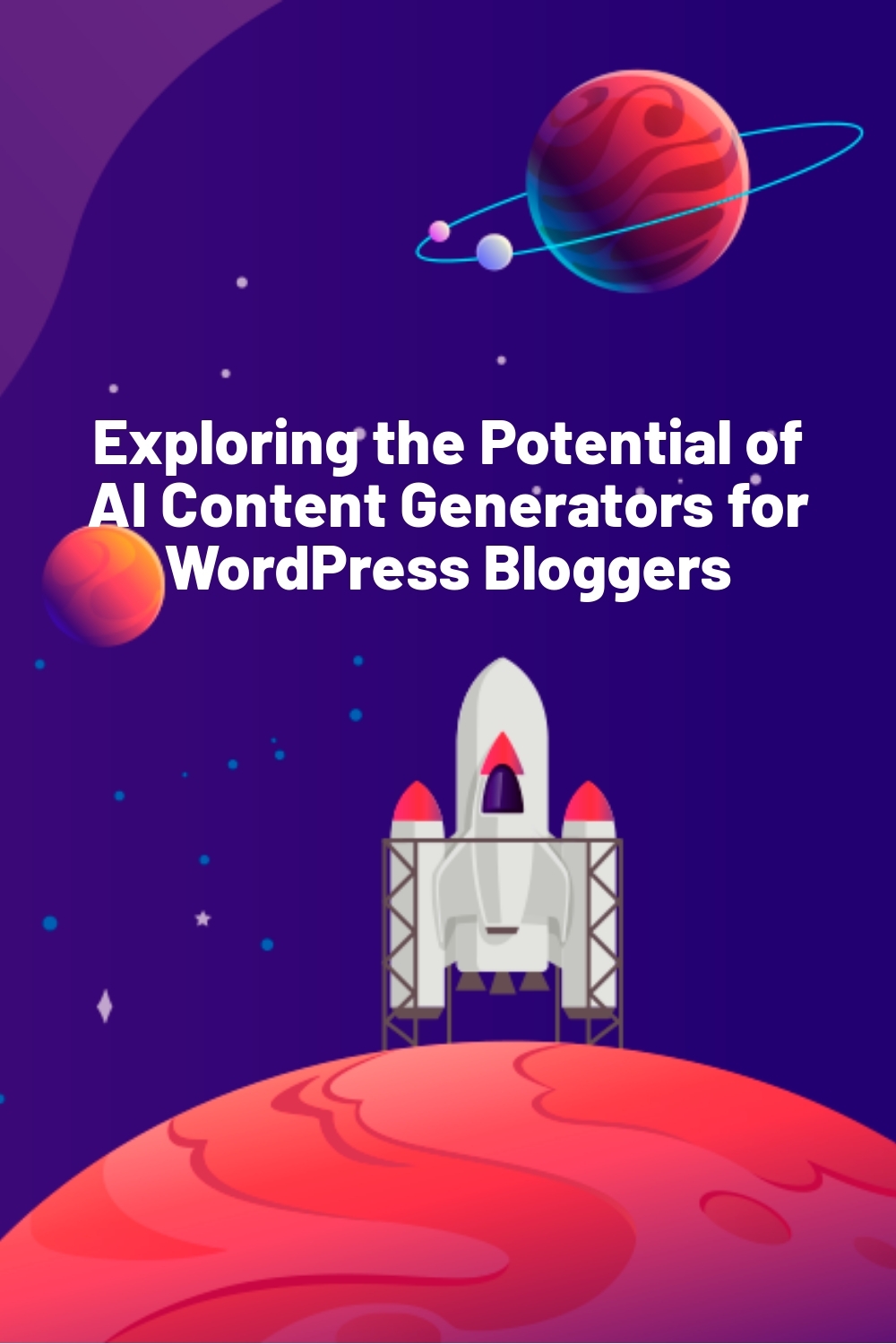

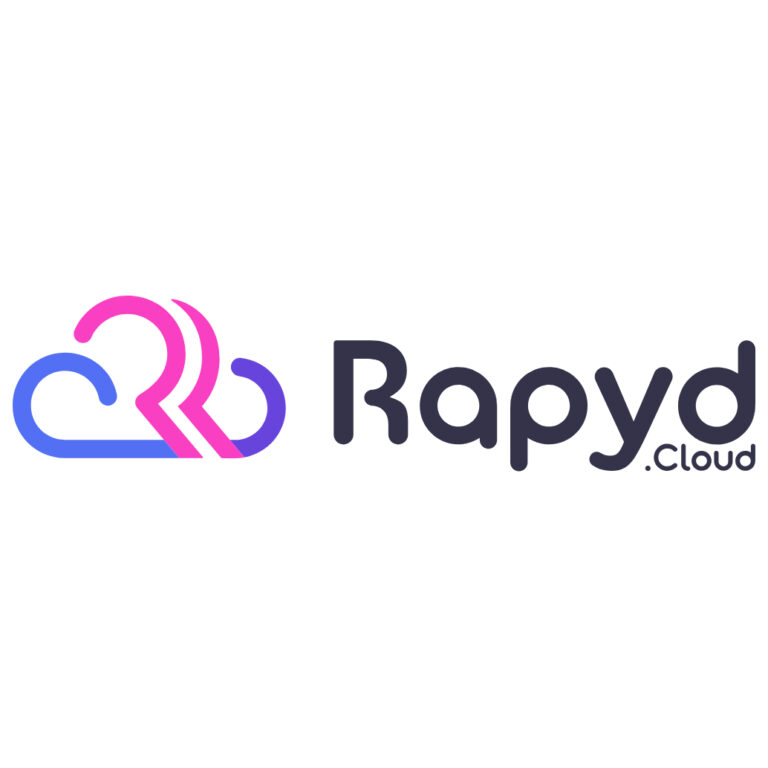



Your Blog is very nice. Wish to see much more like this.
Thanks for sharing your information